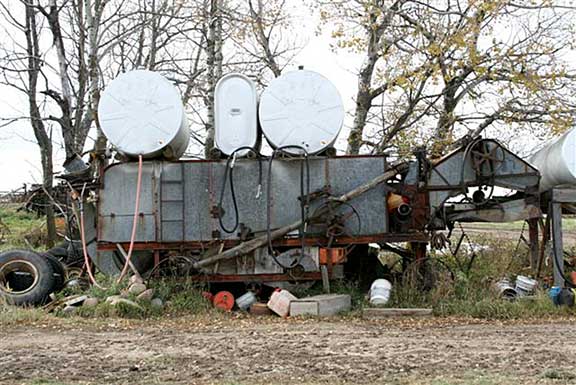| |
Farm Fuel Storage and Handling - What do You do With the Old Tanks? | |
| |
|
|
| |
|
|
| | Because of the inherent risk associated with fuel storage, many property owners are choosing to replace their old tanks or remove them all together, especially underground tanks. There are two main options that a producer can choose from when removing old tanks: recycling via a scrap metal dealer or disposal in a licensed landfill.

Figure 21: Example of an inadequate fuel storage system
Photo courtesy of Alberta Environmental Farm Plan Company, 2006
Tank Recycling
There are some scrap metal dealers that will accept used fuel tanks for recycling, but usually it is required that they be steam cleaned and have holes punched or cut through to ensure that there is no vapour build up. Recycling used fuel tanks can end up being a costly and time consuming process, and there is no guarantee that the producer will get scrap value for their tank.
Many dealers will accept them but don’t offer payment in return.
Tank Disposal
Disposal in your local licensed landfill may be an alternative, depending on the site’s policies.
Some landfills will accept old fuel tanks for disposal while others will not. Checking ahead with the landfill management for their policy on accepting these items may save you valuable time and travel.
Because of the inherent costs and time involved in proper disposal of bulk fuel tanks, selling them to another producer may seem enticing. Although this practice in not encouraged, there are a few things for a producer to keep in mind in order to mitigate some of the risks associated with selling used bulk fuel tanks. First and foremost, ensure that it is not to be used for anything other than fuel storage. It is also a good idea to provide some suggestions to the new owner about secondary containment, proper setback distances and safe fuel handling practices. If a producer is contemplating the purchase of a used fuel tank, he or she should keep the same considerations in mind and try to address any environmental concerns that may arise.
Source: Agdex 769-1. September 2008. |
|
| |
|
|
| |
Other Documents in the Series |
|
| |
Farm Fuel Storage and Handling
Farm Fuel Storage and Handling - Why is Farm Fuel Storage and Handling Such an Important Issue?
Farm Fuel Storage and Handling - What can You do?
Farm Fuel Storage and Handling - What is the Legislation Regarding Farm Fuel Storage?
Farm Fuel Storage and Handling - What are the Risks?
Farm Fuel Storage and Handling - What are Other Common Issues With on Farm Fuel Storage?
Farm Fuel Storage and Handling - What Types of Fuel Storage Systems are Available?
Farm Fuel Storage and Handling - Planning Your Fuel Storage Site - What You Need to Know
Farm Fuel Storage and Handling - What do You do With the Old Tanks? - Current Document
Farm Fuel Storage and Handling - Emergency Procedures
Farm Fuel Storage and Handling - Are There Special Considerations for Storing and Handling Biofuels?
Farm Fuel Storage and Handling - Appendix: Frequently asked questions
Farm Fuel Storage and Handling - Appendix: Emergency Plan and Spill Kits
Farm Fuel Storage and Handling - Appendix: Monitoring for Fuel Losses and Fuel Inventory Sheet
Farm Fuel Storage and Handling - Appendix: For More Information
Farm Fuel Storage and Handling - Appendix: Glossary and Acronyms
|
|
| |
|
|
| |
For more information about the content of this document, contact Melissa Orr-Langner.
This document is maintained by Jennifer Rutter.
This information published to the web on September 26, 2008.
|
|